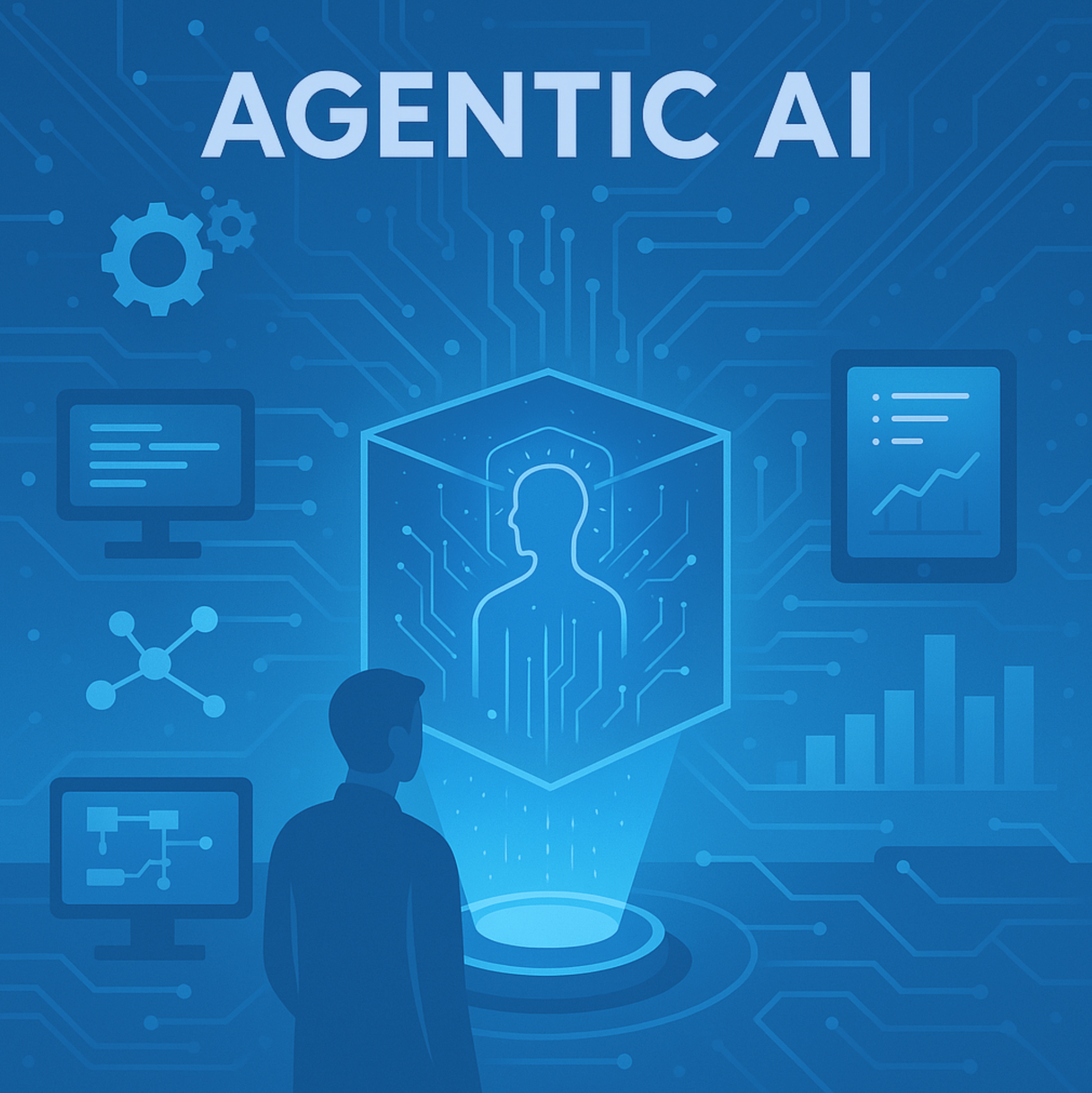Introduction to Agentic AI
Artificial Intelligence has been evolving at a rapid pace, but 2025 has brought a new wave of innovation Agentic AI. Unlike traditional AI systems that rely heavily on explicit instructions, Agentic AI can autonomously make decisions, plan actions, and pursue goals without constant human intervention. This makes it a pivotal technology for the next era of automation and digital intelligence.
What Is Agentic AI?
Agentic AI refers to artificial intelligence systems that possess agency, the ability to set objectives, make strategic choices, and act independently to achieve outcomes. Think of it as AI that’s not just reactive but proactive, anticipating needs, making plans, and adapting to new conditions.
The Rise of Agentic AI in 2025
With advancements in large language models (LLMs), autonomous agents, and multi-step reasoning algorithms, Agentic AI has transitioned from experimental labs into real-world applications in healthcare, finance, education, and beyond. It’s quickly becoming a key driver of smart automation.
Core Principles of Agentic AI
Autonomy in Decision-Making
Unlike standard AI models that wait for user prompts, Agentic AI can initiate actions based on its own analysis of the environment.
Goal-Oriented Behavior
These systems can be assigned high-level objectives and will create and execute a strategy to reach them.
Continuous Learning and Adaptation
Agentic AI can refine its strategies through iterative feedback, improving accuracy and efficiency over time.
How Agentic AI Differs from Traditional AI
From Passive to Proactive Systems
Traditional AI reacts. Agentic AI anticipates and acts much like a skilled personal assistant who knows what you need before you ask.
Enhanced Context Awareness
With memory and reasoning capabilities, Agentic AI understands long-term context, not just isolated instructions.
Multi-Step Reasoning Capabilities
It can handle complex workflows, planning multiple steps ahead to achieve an overarching goal.
Key Applications of Agentic AI in Different Industries
Agentic AI in Healthcare
From predictive diagnostics to personalized treatment planning, Agentic AI is enabling proactive patient care.
Agentic AI in Finance
It can autonomously monitor markets, detect anomalies, and execute trades at optimal times.
Agentic AI in Education
Intelligent tutoring systems can adapt lessons in real-time to match each learner’s pace.
Agentic AI in Manufacturing and Logistics
These systems can optimize supply chains by predicting disruptions and adjusting operations dynamically.
The Technology Behind Agentic AI
Integration of Large Language Models and Autonomous Agents
Agentic AI is powered by large language models (LLMs), like GPT-based architectures, which are integrated with autonomous agent frameworks. This combination allows the system to understand human instructions, break them into actionable steps, and execute them without manual supervision.
The Role of Multi-Agent Systems
Multiple autonomous agents can work together, each specializing in a task, and coordinate their efforts to achieve complex objectives. For example, one agent might gather data while another analyzes it and a third drafts a report.
Combining Symbolic and Neural Approaches
Agentic AI often merges symbolic AI (logic-based reasoning) with neural networks (pattern recognition). This hybrid approach balances interpretability with raw computational power.
Benefits of Implementing Agentic AI
Increased Efficiency
Agentic AI can operate 24/7 without fatigue, completing tasks in minutes that might take humans hours or days.
Reduced Human Supervision
Instead of micromanaging every action, humans can set goals and let the AI handle execution, freeing up time for more strategic work.
Higher Decision Accuracy
Through continuous data analysis and self-improvement, Agentic AI can minimize errors and make data-backed decisions faster than traditional systems.
Challenges and Ethical Considerations
Bias and Fairness Issues
Like all AI, Agentic AI can inherit biases from training data. Ensuring fairness requires careful dataset curation and bias mitigation strategies.
Explainability and Transparency
Since these systems make decisions independently, it’s crucial to develop explainable AI models that clarify their reasoning processes.
Safety and Control Measures
While autonomy is powerful, it raises concerns about overreach. Safeguards such as human-in-the-loop systems are essential to prevent unintended consequences.
The Future of Agentic AI
Emerging Trends
We can expect more human-like reasoning abilities, better long-term memory, and integration into everyday consumer tools like personal assistants and smart devices.
Potential Disruptions Across Sectors
Agentic AI has the potential to redefine work by automating knowledge-based tasks, revolutionizing customer service, and enabling self-optimizing business operations.
FAQs About Agentic AI
Q1: What makes Agentic AI different from other AI systems?
Agentic AI can autonomously set and pursue goals, whereas traditional AI needs step-by-step human input.
Q2: Can Agentic AI work without human supervision?
Yes, but for safety, many applications keep a human-in-the-loop for oversight.
Q3: How safe is Agentic AI?
Safety depends on proper design, testing, and implementation of control measures.
Q4: What industries will benefit the most?
Healthcare, finance, logistics, manufacturing, and education are early adopters.
Q5: How does Agentic AI learn?
It learns through continuous feedback loops, combining new data with prior experience.
Q6: Is Agentic AI already in use today?
Yes, from autonomous trading systems to AI-powered research assistants, real-world deployments are growing.

Leave a Reply
You must be logged in to post a comment.